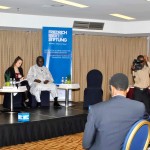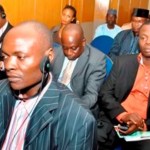Statehood as a crucial problem of insecurity
Not only did the ‘Arabellion’ movement change political realities of some countries in North Africa, it also precipitated major changes in the Sahel. Not least because the political crisis in Mali reveals how Islamist forces are gaining increasingly influence in the region. Against this background FES invited for the fifth public discussion in the series Abuja Debate on the 21 November 2012 in the capital of Nigeria, Abuja. Five discussants from Europe and West Africa were talking about ‘Long Term Perspectives on Security in North and West Africa’. As an overall conclusion of the discussion, both panelist and participants from the audience emphasised that the source of insecurity is mainly caused by poor governance of state institutions.
This time, the Abuja Debate was framed by a three-day international conference called Abuja Dialogue on the same topic. As an open panel discussion FES intented to share and discuss the findings of the conference with the wider public. As panelist amongst others was invited the international consultant on AU, African peace and security as well as migration matters Dr. Mehari Maru from Ethiopia. He was joined by the Ghanaians Dr. Kwesi Aning from the Kofi Annan International Peacekeeping Training Centre (KAIPTC) and Honourable Osei-Mensah from the Ghanaian Parliament as well as Chairman for the Political Affairs, Peace and Security Committee of the ECOWAS Parliament. The expert on EU strategies on the Sahel, Mrs. Bérangère Rouppert from the Belgium research centre Groupe de Recherche et d’information sur la Paix et la Securite (GRIP) completed the panel that was moderated by Mr. Amadu Sesay, Professor of International Relations at Ile-Ife University.
Analysing the causes of insecurity
‘When looking at long-term perspectives of insecurity in North and West Africa the nature of statehood becomes a critical aspect’, as Dr. Maru pointed out. Poor Governance through self-interested political elites is more the rule than the exception in the region. Peripheries and areas of lawlessness are consequences of weak and delegitimized state authority. In the absence of strong institutions, existing social cleavages in society cannot be mediated adequately. Therefore socio-economic conflict is likely to occur. This context however is a perfect breeding ground for Transnational Organised Crime and other forces that flourish in situations of insecurity.
Poor Governance comes along with a lack of control in terms of check and balances of the three branches. Traditionally in a democracy it is the legislative that is to make laws. But in North and West Africa the legislative branch as well as the judiciary is undermined by a dominant executive body. Effectively the notion of mutual control is invalid. Honorable Osei-Mensah stated that the fragility of young African democracies was also rooted in this democratic deficits. By excluding parliaments from political decision making the voice of the people becomes consequently restricted.
Democracy in Mali has not been any better than a 'Mafia System'
Obviously, talking about the Sahel cannot preclude the discussion of the current situation in Mali. One expert from the desert state sharply remarked that the coup d’état of March 2011 was not a surprise within the Malian society. The West however glorified a political structure best characterized as a ‘Mafia System’ that was based on corruption and nepotism. Dr. Aning added to this observation that recent developments in Mali can happen everywhere in the region. 'If Mali teaches one thing', he continued, 'it is that ignoring fundamental problems in a society will lead to a spread in terrorism and criminal activities in the region.'
Can ECOWAS be a stabilising factor for the region?
The experts on the panel did not question the forthcoming ECOWAS intervention in Northern Mali as such. However they raised likely problems that might occur during the preparation and conduction of the intervention as well as the transitional period after the military involvement: Is Mali’s army really capable to engage in the way it is foreseen by international actors? Which role will Nigeria play in the whole undertaking? Are not the forces of Niger more skilled to deal with the desert than the Nigerians do? What about a profound exit strategy in order to avoid the failures of Iraq and Afghanistan? Will and can the International Community and ECOWAS actually tackle the problems in Northern Mali after they have succeeded in restoring peace and security? Those doubts raised make it obvious that ECOWAS is another uncertain factor in the whole process where the actual outcome cannot yet be predicted.
Extra-regional interests in the region
Despite high reservation towards a direct military engagement, the International Community has vital interests in the region to protect thus pushing for immediate actions. According to Mrs. Rouppert these interests are especially energy and the fight against terrorism when it comes to the US. But also former colonial power France wants to keep his influence in the region and is strongly opting in favor of a military intervention whereas the EU as such is interested in a stable Sahel region in order to prevent high migration rates, criminal trafficking and the security of energy supplies to the continent.
Will the International Community this time learn from its failures? As Mrs. Rouppert pointed out strategies implemented in the past were neither timely nor adequately due to the fact of poor dialogue and partnership. Dr. Aning and Honerable Osei-Mensah agreed with this point and argued in favor of a stronger African voice. This might lead, so the conclusion of the experts to a more adequate reaction that is both more efficient and beneficial for the people in the region.
African solutions for African problems
What are now the long-term perspectives of security in the region? According to the contributions of the audience, obviously there is a need for African institutions to built capacity – not only in the military sense but more crucially in the civilian component of conflict prevention and peace building. That means to broaden a variety of response mechanisms to actually tackle conflicts in an African way without relying mainly on the Western countries’ resources. This goes along with the need to address core problems as soon as they arrive in an adequately and seriously manner. Nevertheless without uniting every actor in the Sahel region under one common goal, especially reluctant Algeria, stabilisation cannot be achieved. But the core of all those actions can be subsumed under the urgency to install legitimate national governments that foster Good Governance so that ‘chronic illnesses’ of the region like corruption, poverty or high dissatisfaction among the youth bulge can eventually be approached.
Friedrich-Ebert-Stiftung
Peace and Security Centre of Competence Sub-Saharan Africa
Point E, Rue de Fatick x Boulevard de l'Est,
Residence Bity Lokho, 6th floor
B.P. 15 416
Dakar - Fann




